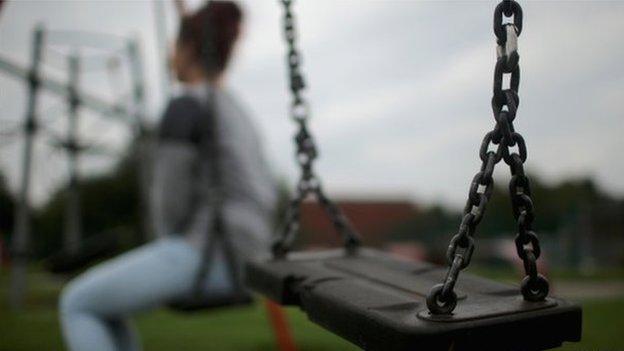Action urged over social workers' loads
- Published

Almost as many people left children's social work jobs as started them in England in 2015
High drop-out rates among England's social workers must be tackled urgently as they grapple with the pressure of increasing workloads, MPs say.
The Commons Education Committee says the government has not addressed the "endemic retention problems" in the profession.
Its report highlights how the vacancy rate has grown by a quarter since 2014, leaving 17% of jobs unfilled in 2015.
The government said it was investing to improve the quality of social work.
The average career in social work lasts less than eight years, compared to 16 for a nurse and 25 for a doctor.
'Immense pressure'
And high vacancy rates have led to increased reliance on agency workers
This is at a time when the number of children in care is at its highest rate for three decades.
Ministers need to work more closely with the profession at a time when "social work is under immense pressure" the report says, before adding that social workers are facing increasing workloads and local authorities are wrestling with tighter funding.
"The government's new reforms do not focus enough on tackling the endemic retention problems," it continues.
"Poor working conditions, caused by high caseloads, negative media coverage and a dysfunctional 'blame culture', are driving experienced social workers from the profession.
"Limits should be placed on caseloads and a national workforce planning system created to forecast supply and demand."
The committee heard how social workers' morale was "extremely low".
Excessive workloads were one of the primary causes of this and evidence suggests caseloads are at dangerously high levels, it heard.
Ofsted's most recent social care report from 2013-14 found that reports from various sources cited high caseloads year on year.
A survey in 2012, by the British Association of Social Workers, found that 77% of respondents thought their caseloads were at an unmanageable level.
'Blame culture'
Committee chairman Neil Carmichael said: "The government's new reforms do not focus enough on tackling the endemic retention problems in children and families' social work and ministers must now make it a priority to fix this issue.
"Improving post-qualifying prospects, increasing the voice of social workers at a national level and changing the 'blame culture' persistent in social work, are important steps which can be driven forward by a strong professional body."
The committee also recommends that the government's many reforms are allowed to settle before others are introduced.
It calls for ministers to draw up an in-depth delivery plan for the reforms it has already launched as well as new ones - and suggests a national public awareness campaign to celebrate the positive aspects of social work.
A Department for Education spokeswoman said the government agreed "both that social work is one of our most important public services and that work is needed to improve its quality. Excellent social work transforms lives".
She added: "That's why the government has invested over £700m in training and recruitment, why we have committed a further £200m to innovation projects intended to increase the quality of social care practice and why we intend to accredit every children and family social worker in the country to a high standard."
The spokeswoman added that the government was working on plans for a specialist regulator for social work in conjunction with the profession.
- Published15 May 2016

- Published20 April 2016
